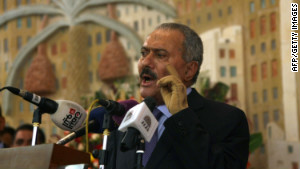
(CNN)– By Tim Lister – Ali Abdullah Saleh, who was President of Yemen for decades and once compared governing the country to “dancing on the heads of snakes,” was killed on Monday at the age of 75. His death will instantly transform the political landscape in Yemen, a country that’s been gripped by conflict for three years. Saleh was killed amid clashes with his erstwhile allies in Yemen — the Iranian-backed Houthi rebels. He had joined forces with the Houthis in 2014, prompting Saudi Arabia and the United Arab Emirates to launch an offensive against what was never more than a marriage of convenience. For Saleh, the marriage had recently become inconvenient. On Saturday he declared he was calling on “the brothers in neighboring states and the alliance to stop their aggression, lift the siege, open the airports and allow food aid and the saving of the wounded.” “In return,” he promised, “we will turn a new page by virtue of our neighborliness.”
The Houthis’ political office immediately accused Saleh of staging a coup against “an alliance he never believed in,” and warned that Saudi Arabia and its allies would “pay a heavy price in their own capitals” — not the first time it has threatened attacks in Riyadh and Abu Dhabi. Clashes between militias loyal to Saleh and Houthi gunmen have worsened an already grave humanitarian situation. More than 100 people have been killed since the fighting began, according to the International Committee of the Red Cross — and two hospitals in Sanaa were “running critically low” of supplies. The exact circumstances of Saleh’s death are unclear, but it will set off a bitter struggle for control of Sanaa. Saleh’s supporters are led by his nephew Tareq Moahmmed Saleh, the former head of Yemen’s special forces. The Houthis are effective fighters from northern Yemen who survived multiple offensives by Saleh when he was President. But they now face even more enemies, as well as airstrikes by Saudi and UAE forces. Much will now depend on whether Saleh’s allies around Sanaa are able to evict the Houthis, or whether street-by-street battles cause even more destruction. If this is a genuine realignment of forces, and the Houthis are eventually expelled to their northern strongholds, it may bring one step closer an end to the war that has left Yemen on the verge of famine and more than two million people displaced. But there’s more fighting ahead before that becomes possible.
The Iran question
Saudi Arabia and the UAE will see the dramatic realignment in Yemen as a path to defeating the Houthis. A senior UAE official, Anwar Gargash, said on Twitter that “the events in Sanaa are murky, but its national uprising needs support … to protect the Arabian Peninsula from Iranian expansion.” Saudi Arabia and the UAE see the Houthis — a group that follows the Zaidi branch of Shia Islam — as a proxy for Iran in a far larger contest for influence that also encompasses Iraq, Syria and Lebanon. The Saudis stepped up air strikes and a blockade of Houthi-held ports after the rebels fired a ballistic missile at Riyadh airport at the beginning of November. They allege that Iran and Hezbollah — the Lebanese Shia militia — have provided know-how and parts to sustain the Houthi missile program. Iran has denied any such involvement. However, Reuters reported last week that a UN panel had concluded that the remnants of missiles fired at Saudi Arabia were “consistent with those reported for the Iranian designed and manufactured Qiam-1 missile.” Saudi Crown Prince Mohammed bin Salman said that Iranian support for the Houthis amounts to “direct military aggression” that may amount to an “act of war.” The question now is whether Iran and Hezbollah will deepen their backing for the isolated Houthis.
The return of a Saleh?
For decades, Saleh was Yemen’s great survivor. He became the ruler of North Yemen in 1978 when the south was a separate, communist state. He was adroit in navigating Yemen’s complex tribal and sectarian patchwork, and in leading unification with the south in 1990. During the Arab Spring in 2011, he defied massive protests in Sanaa and other cities even as he promised that he would step down. He was then nearly killed in a mortar attack — and had to leave Yemen for medical treatment in Saudi Arabia. Saleh reinjected himself into Yemen’s violent and complex politics by taking sides with the Houthis. Even though he is now gone, his family remains powerful. Sources in the Gulf say the coalition may groom Saleh’s son Ahmed Ali Abdullah (who was Yemen’s ambassador in the UAE) for a role in Yemen, even though he is under United Nations sanctions. The sources say that for the Saudi Crown Prince, a deal with the Saleh clan would be a price worth paying if it marginalizes the Houthis and weakens Iran’s position in Yemen. But for now, the country remains a patchwork of fiefdoms awash with weapons and plummeting towards a humanitarian disaster. The Houthis still control important harbors such as Hodeida. Al Qaeda in the Arabian Peninsula is exploiting the chaos (and the fear among Sunnis of Houthi domination); and ISIS, too, has a presence. So fractured is Yemen — and so desperate the humanitarian situation — that it will take years rather than months to return the country even to a semblance of stability.



